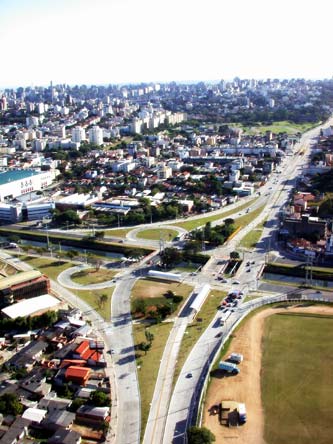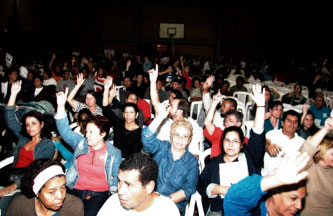Participatory Budgeting
Results
The most obvious result of participatory budgeting can be seen in the improvements to people’s living conditions. In 15 years, investment has gone up to over 700 million dollars. Between 1989 and 1996, the number of households with access to water services rose from 80% to 98%; the percentage of the population served by the municipal sewage system rose from 45% to 85%; numbers of children enrolled in public schools doubled and illiteracy rates dropped by half (from 6% to 3%); since 1989, 30 kilometres of roads have been paved annually in the poorer neighbourhoods.
As a result of the transparency and decision-making processes introduced by participatory budgeting, people are more motivated to pay taxes and revenue has increased by 50%.
Around 40% of the people taking part in participatory budgeting meetings have modest incomes of one to three times the minimum wage. There is a fair gender balance, although presence of women decreases at higher decision-making tiers. Middle-class people, who were sceptical at first, now take an active part in participatory budgets.
To reduce exclusion, the administration has implemented programmes and projects of its own and in partnership with society to find new ways of including the population in budgeting activities. The practice set up by the municipality of Porto Alegre involves structured interdepartmental action in the fields of public policies, social control and social justice. 
PUBLIC POLICIES
The people of Porto Alegre have made the themes of education, health, housing, and social assistance the priority issues in participatory budgets, guaranteeing investment of public resources in social areas.
The government has guaranteed resources for housing, paving of roads and sanitation, together with international financial organisations such as the Inter-American Development Bank, the World Bank and FONPLATA.
The Mayor’s Office, which sees public policies as a way of guaranteeing people’s rights, has developed projects and programmes to set up internal and external networks that enable social needs to be met in full.
The best example of joint action can be seen in the Social Policies Forum (FPS), where efforts are made to overcome sectoral divisions over the implementation of public social policies. One of the permanent challenges of the Forum is to make sure that the government takes effective and integrated action, with joint participation from municipal institutions.
Besides forums within the government framework, intra-municipal action is also fostered, which constitutes an effective counterweight to the process of exclusion that exists in the country. Thus, public policies are formulated both within the framework of municipal government, which encourages interdepartmental discussion and action, and in partnership with people’s forums. 
SOCIAL CONTROL
Social control means creating mechanisms for popular participation. It is the civil society, in partnership with the municipality, which defines policies for children and adolescents, health, education, housing and social assistance using mechanisms such as participatory budgeting, municipal councils and other types of democratic participation.
To consider only statistical data would be to underestimate the effects of participatory budgets. The progress made has profoundly changed mentalities and restored dignity to entire groups of the population.
Participatory budgeting has also changed the attitude of municipal technical staff in their relations with citizens. They pay greater attention to what people say and communicate in a language that people can understand.
The feasibility of the experience essentially depends on the political will of the municipality. In effect, participatory budgeting is an annual process and renewal is decided by the municipal authorities.
SOCIAL JUSTICE
Participatory budgeting is also an instrument of social justice in three ways: in terms of taxation, distribution and politics. This means not only regenerating the public sector’s financial, strategic and administrative capacity, but also making sure that those that earn most pay most. The increases in revenue witnessed in Porto Alegre clearly show that co-management of the municipal budget has given political credibility to the government to improve the municipal finances and obtain international recognition and funding for the city (World Bank, Inter-American Development Bank, FONPLATA). With the advent of participatory budgeting, there has been a drop in non-payment of direct municipal taxes.
Secondly, it effectively involves establishing positive discrimination and rightly giving more to those who have the least. Participatory budgeting regulations take into account community needs and population densities.
Thirdly, it involves changing state-society relations, providing openings for those that have never had any say, giving greater political power to those who have the least economic power. Of course this power sharing process does not just depend on will alone. Learning a new way of exercising power and establishing strong participatory governance is not something that is easy. It is a challenge that local authorities and citizens must build on together.
Participative budgeting has proved that democratic and transparent administration of resources is the only way to avoid mishandling of public funds and to ensure that investments are directed towards the most pressing needs of the most number of people. Participative budgeting has also proved that the creation of effective participatory tools and government commitment to meet people’s demands are essential in overcoming the bureaucratic barriers that separate society from the state, and forming an active and mobilized citizenship. In Porto Alegre, the citizens know and decide on public issues, transforming themselves, therefore, in agents of their own future.
DOWNLOAD THE BROCHURE PDF
portuguese (0.8 MB)english (1.0 MB)
spanish (1.0 MB)
ONLY TEXT
•Participatory Budgeting in practice








 COUNTRY OF ORIGIN
COUNTRY OF ORIGIN